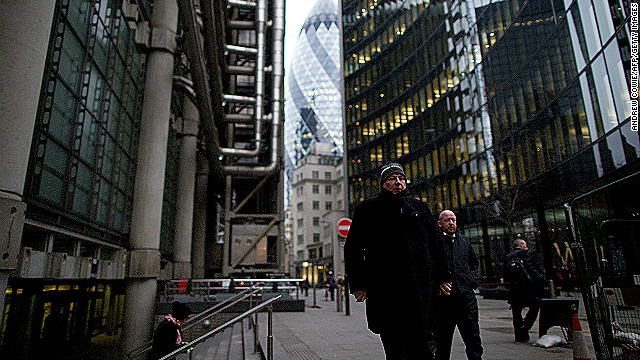City workers leave their offices on January 25, as Britain's economy was reported to have shrank 0.3 percent in Q4 2012.
(Financial Times) -- The most stringent curbs on bankers' pay since the 2008 financial crisis are to be imposed by the EU, as Britain faces defeat in Brussels over an issue dear to the City of London.
Talks on EU reforms to make banks safer are entering a potentially decisive week with London heavily outgunned after almost a year of backroom diplomacy to blunt a bonus crackdown pushed by the European Parliament.
France is now backing the parliament's demand for strict limits on bonuses that exceed salary, and a clear majority -- which now crucially includes Germany -- want to compromise so the bonus dispute does not hold up reforms of bank capital rules.
This hardening of opinion is enabling Ireland, which holds the EU's rotating presidency, to press the three UK-led holdouts to agree terms it can offer parliament on Tuesday. Dublin is confident it already has a strong majority.
British officials are scrambling to secure revisions to the tentative compromise, which imposes a 1:1 bonus to salary ratio, which can be raised to 2:1 with the backing of a supermajority of shareholders.
In a sign of how far the debate has moved, Britain circulated an informal position paper on Friday, seen by the Financial Times, suggesting alternative reforms that "build on the principle of a cap" while removing elements that would backfire.
It strengthens current rules enforced in the UK with an absolute ban on upfront cash bonuses that exceed salary and a requirement for bank shareholders to set a cap on variable to fixed pay.
However, this offer falls well short of parliament's key demand: a tight range-bound maximum ratio covering the entire bonus. Diplomats said the UK's chances of significantly redefining or raising the 2:1 ratio were slim.
Other proposed adjustments have more promise, such as exempting EU-based banks from applying the rules to their offshoots outside Europe and incentivising the use of bail-in bonds. As it stands, the curbs apply to all banks operating in Europe and their international subsidiaries and branches.
The eight-page UK paper argues that the parliament's fixed ratio will encourage "large cash fixed salaries", undermine financial stability and weaken existing clawback rules, which banks are beginning to enforce.
London's ratio can be set at any level and excludes "long-term" remuneration; the form of the pay must track the bank's health, such as equity or bonds that are wiped out when a bank fails.
The UK said: "We've always been in favour of a rigorous regime, but we need to make sure any reforms don't create unintentional incentives that actually achieve the reverse of what is intended."
Top bank chief executives have urged David Cameron, UK prime minister, to oppose the curbs vigorously. "The banks are panicking," said one diplomat involved in the talks. "They always thought the UK and Germany would save them."
The reverberations of a strict cap will run beyond the banking sector. MEPs are already pushing for the tougher version eventually to apply to hedge funds and investment managers, who are subject to existing bonus rules designed for banks.
EU ministers have studiously avoided discussing remuneration in public. But the private diplomacy has been more active. George Osborne, UK chancellor, repeatedly discussed the issue with Wolfgang Schäuble, Germany's finance minister, including in recent weeks.
While Berlin last summer floated alternative, less onerous remuneration reforms, it no longer has the appetite for a long fight with parliament given the urgent need to agree the capital reforms.
Without Mr Schäuble at his side, it is unclear whether Mr Osborne will see the issue as important enough to dig in and require a public debate of finance ministers, where he would risk being portrayed as a champion of big bonuses.
source
please give me comments thanks


 9:11 PM
9:11 PM
 admin
admin





0 comments:
Post a Comment